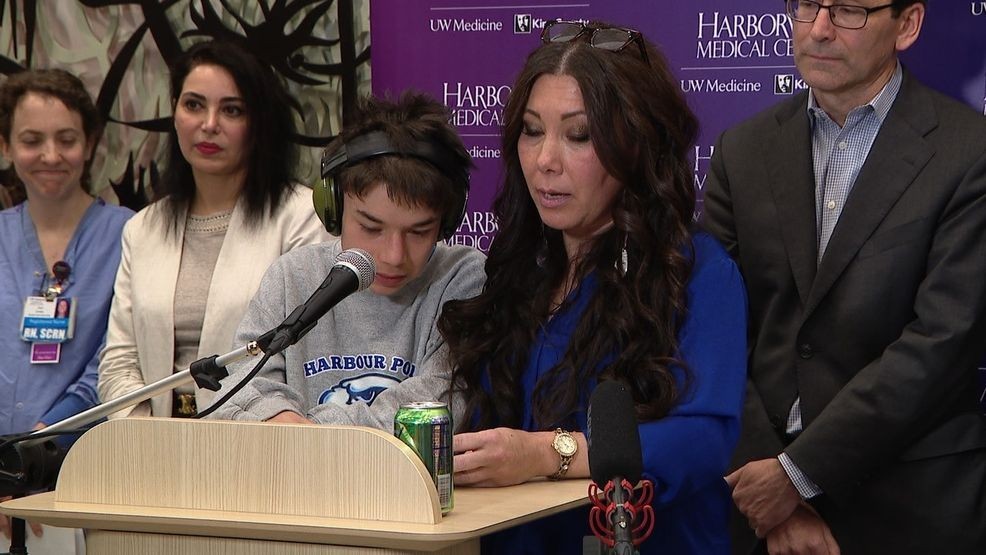SEATTLE — President Donald Trump’s “big, beautiful bill” that passed the House has sparked concerns over its potential impact on Medicaid recipients in Washington state.
The bill, which increases tax cuts but reduces spending and reimbursements on Medicaid, could force millions of recipients to work or lose coverage, according to its backers.
Local health leaders and government officials say if the bill passes, tens of thousands of families in Washington state will be impacted. While there is a lot that is unknown at this point, the vote in Washington, D.C. has set the stage for a major policy shift on Medicaid and billions of dollars in changes and coverage in Washington state.
On Thursday, Gov. Bob Ferguson held a press conference at Harborview Medical Center to address Congress’s proposed cuts to Medicaid, which could impact health care access for nearly 2 million residents of Washington state. Among the speakers at Harborview on Thursday was Jen Chong Jewell, with her 14-year-old son Gabriel by her side. She said Gabriel has had a couple of operations and services paid for by Medicaid.
“Medicaid has been so integral in supporting (Gabriel’s) growth, his development, and where he is today,” she told KOMO News.
The bill, supported by Trump and his cabinet, includes cuts to Medicaid funding and eligibility, requiring “able-bodied” adults to work or volunteer to receive benefits. The non-partisan Congressional Budget Office estimates the bill would impact 7.7 million Americans, including tens of thousands in Washington state.
Harborview Medical Center CEO Sommer Kleweno Walley suggested any funding cut could be devastating for the hospital and the rest of the system.
“With the repeal of a lot of this, you will see a lot more unfunded individuals, which will cost places like Harborview,” she told KOMO News.
ALSO SEE | Washington leaders unite against proposed Medicaid cuts, warning of dire health impacts
The Washington State Hospital Association has also suggested rural hospitals could be in danger of closing, citing eight hospitals that received 25% or more of their payer mix from Medicaid. Othello Community Hospital in central Washington gets 58% of its revenue from Medicaid reimbursements.
“Hundreds of millions of dollars to your bottom line every year, as you can imagine, would decimate the ability to do all of that care,” Walley said.
There is a lot that is still unknown, and the possibility that the Senate could amend the legislation that was passed by the House, leaving many anxiously awaiting the next vote.
Jewell, reflecting on the potential changes, said, “It’s so hard as it is right now to imagine it being dismantled is just devastating.”
Around one in five Washingtonians are enrolled in the state’s Medicaid program, including around 800,000 children.
Ferguson called the situation “dire” during Thursday’s press conference, and said the recently passed state budget, which protected the rainy-day fund, wouldn’t be able to fund what would be a significant change in federal Medicaid reimbursements.
ALSO SEE | Gov. Ferguson addresses Medicaid cuts that could affect 2 million Washingtonians
Washington state spends around $21 billion on Medicaid a year. Ferguson’s office said approximately $8 billion of that is paid for by the state, while $13 billion is paid by the federal government. If the bill passes the Senate as it stands, Ferguson said Washington state “stands to lose” around $2 billion in Medicaid funding over the next four years.
“Medicaid is a lifeline to affordable, quality healthcare — and these cuts would impact everyone in Washington who relies on it,” Ferguson said. “Fewer services, fewer doctors and fewer clinics mean Washingtonians in every corner of the state face reduced access to health care. It is both cruel and catastrophic.”
The bill also threatens access to health care and food stamps in the state, according to Ferguson’s office. The proposed legislation cuts the Supplemental Nutrition Assistance Program by $267 billion over 10 years, which would shift costs to the states.


